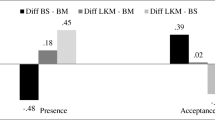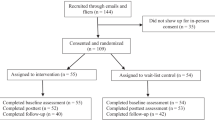Abstract
The intent of the current research was to explore the impact of a specific Tibetan Buddhist meditation course containing a lab for applied practice of modern techniques upon psychological well-being in college students. We evaluated the impact of a semester-long undergraduate Tibetan Buddhist meditation course on the psychological well-being of 205 students and assessed whether changes in well-being were mediated by mindfulness. The course was composed of two weekly lectures regarding the tradition and modern applications of meditation, respectively, and a weekly lab in which the students were taught a survey of related modern contemplative techniques to practice. Students were assessed at the beginning, middle, and end of the course, and their time spent practicing the exercises were prospectively recorded. Participants reported statistically significant increases in self-reported mindfulness, self-compassion, and positive coping and significant decreases in self-reported anxiety. Mindfulness was a significant predictor of changes in self-compassion and anxiety. These results suggest that a large lecture course with weekly meditation practice can have a positive impact on the psychological well-being of students and that some of these changes are mediated by mindfulness.
Similar content being viewed by others
References
Baer, R. A., Smith, G. T., Lykins, E., Button, D., Krietemeyer, J., Sauer, S., et al. (2008). Construct validity of the Five Facet Mindfulness Questionnaire in meditating and nonmeditating samples. Assessment, 15(3), 329–342.
Bishop, S., Lau, M., Shapiro, S., Carlson, L., Anderson, N., Carmody, J., et al. (2004). Mindfulness: a proposed operational definition. Clinical Psychology: Science and Practice, 11(3), 230–241.
Brown, K. W., & Ryan, R. M. (2003). The benefits of being present: mindfulness and its role in psychological well-being. Journal of Personality and Social Psychology, 84(4), 822–848.
Burns, J., Lee, R., & Brown, L. (2011). The effect of meditation on self-reported measures of stress, anxiety, depression, and perfectionism in a college population. Journal of College Student Psychotherapy, 25(2), 132–144.
Chiesa, A., & Serretti, A. (2009). Mindfulness-based stress reduction for stress management in healthy people: a review and meta-analysis. Journal of Alternative and Complementary Medicine, 15(5), 593–600.
Davidson, R. J., Kabat-Zinn, J., Schumacher, J., Rosenkranz, M., Muller, D., Santorelli, S. F., et al. (2003). Alterations in brain and immune function produced by mindfulness meditation. Psychosomatic Medicine, 65(4), 564–570.
Deckro, G. R., Ballinger, K. M., Hoyt, M., Wilcher, M., Dusek, J., Myers, P., et al. (2002). The evaluation of a mind/body intervention to reduce psychological distress and perceived stress in college students. Journal of American College Health, 50(6), 281–287.
Duerr, M. (2004). A powerful silence: the role of meditation and other contemplative practices in American life and work. Northampton, MA: The Center for Contemplative Mind in Society.
Garnefski, N., & Kraaij, V. (2006). Cognitive emotion regulation questionnaire—development of a short 18-item version (CERQ-short). Personality and Individual Differences, 41(6), 1045–1053.
Garnefski, N., & Kraaij, V. (2007). The cognitive emotion regulation questionnaire: psychometric features and prospective relationships with depression and anxiety in adults. European Journal of Psychological Assessment, 23(3), 141–149.
Germer, C., & Neff, K. (2013). Self-compassion in clinical practice. Journal of Clinical Psychology, 69(8), 856–867.
Hutcherson, C. A., Seppala, E. M., & Gross, J. J. (2008). Loving-kindness meditation increases social connectedness. Emotion, 8(5), 720–724.
Jha, A. P., Krompinger, J., & Baime, M. J. (2007). Mindfulness training modifies subsystems of attention. Cognitive, Affective, & Behavioral Neuroscience, 7(2), 109–119.
Julian, L. (2011). Measures of anxiety: state-trait anxiety inventory (STAI), Beck Anxiety Inventory (BAI), and Hospital Anxiety and Depression Scale-Anxiety (HADS-A). Arthritis Care & Research, 63(Supplement Sll), S467–S472.
Kabat-Zinn, J. (1990). Full catastrophe living: using the wisdom of your body and mind to face stress, pain, and illness. New York: Delacorte.
Lazar, S. W., Kerr, C. E., Wasserman, R. H., Gray, J. R., Greve, D. N., Treadway, M. T., et al. (2005). Meditation experience is associated with increased cortical thickness. Neuroreport, 16(17), 1893–1897.
Malouff, J. M., & Schutte, N. S. (1986). Development and validation of a measure of irrational belief. Journal of Consulting and Clinical Psychology, 54(6), 860–862.
Mind and Life Education Research Network (MLERN). (2012). Contemplative practices and mental training: prospects for American education. Child Development Perspectives, 6(2), 146–153.
Neff, K. (2003). The development and validation of a scale to measure self-compassion. Self and Identity, 2(3), 223–250.
Nidich, S. I., Rainforth, M. V., Haaga, D. A. F., Hagelin, J., Salerno, J. W., Travis, F., et al. (2009). A randomized controlled trial on effects of the transcendental meditation program on blood pressure, psychological distress, and coping in young adults. American Journal of Hypertension, 22(12), 1326–1331.
Oman, D., Shapiro, S. L., Thoresen, C. E., Flinders, T., Driskill, J. D., & Plante, T. G. (2007). Learning from spiritual models and meditation: a randomized evaluation of a college course. Pastoral Psychology, 55(4), 473–493.
Oman, D., Shapiro, S. L., Thoresen, C. E., Plante, T. G., & Flinders, T. (2008). Meditation lowers stress and supports forgiveness among college students: a randomized controlled trial. Journal of American College Health, 56(5), 569–578.
Pommier, E. A. (2011). The compassion scale. Dissertation Abstracts International, 72, 1174.
Raudenbush, S. W., & Bryk, A. S. (2002). Hierarchical linear models: applications and data analysis methods (2nd ed.). Thousand Oaks, CA: Sage Publications.
Roberts-Wolfe, D., Sacchet, M. D., Hastings, E., Roth, H., & Britton, W. (2012). Mindfulness training alters emotional memory recall compared to active controls: support for an emotional information processing model of mindfulness. Frontiers in Human Neuroscience, 6(15).
Rosenzweig, S., Reibel, D. K., Greeson, J. M., Brainard, G. C., & Hojat, M. (2003). Mindfulness-based stress reduction lowers psychological distress in medical students. Teaching and Learning in Medicine, 15(2), 88–92.
Roth, H. (2014). A pedagogy for the new field of contemplative studies. In O. Gunnlaugson, E. W. Sarath, C. Scott, & H. Bai (Eds.), Contemplative approaches to learning and inquiry across disciplines (pp. 97–118). Albany: SUNY Press.
Ryff, C. D., & Keyes, C. L. M. (1995). The structure of psychological well-being revisited. Journal of Personality and Social Psychology, 69(4), 719–727.
Sears, S., & Kraus, S. (2009). I think therefore I am: cognitive distortions and coping style as mediators for the effects of mindfulness meditation on anxiety, positive and negative affect, and hope. Journal of Clinical Psychology, 65(6), 561–573.
Shapiro, S. L., Brown, K. W., & Biegel, G. M. (2007). Teaching self-care to caregivers: effects of mindfulness-based stress reduction on the mental health of therapists in training. Training and Education in Professional Psychology, 1(2), 105–115.
Shapiro, S. L., Brown, K. W., & Astin, J. A. (2008). Toward the integration of meditation into higher education: a review of research. Northampton, MA: The Center for Contemplative Mind in Society.
Silverstein, R. G., Brown, A. C. H., Roth, H. D., & Britton, W. B. (2011). Effects of mindfulness training on body awareness to sexual stimuli: implications for female sexual dysfunction. Psychosomatic Medicine, 73(9), 817–825.
Spielberger, C. D., Gorsuch, R. L., Lushene, R., Vagg, P. R., & Jacobs, G. A. (1983). Manual for the State-Trait Anxiety Inventory. Palo Alto, CA: Consulting Psychologists Press.
Watson, D., Clark, L., & Tellegen, A. (1988). Development and validation of brief measures of positive and negative affect: the PANAS scales. Journal of Personality and Social Psychology, 54(6), 1063–1070.
Zenner, C., Herrnleben-Kurz, S., & Walach, H. (2014). Mindfulness-based interventions in schools—a systematic review and meta-analysis. Frontiers in Psychology, 5(603).
Author information
Authors and Affiliations
Corresponding author
Ethics declarations
This study was approved by the UVA Institutional Review Board-Social and Behavioral Sciences and has been performed in accordance with the ethical standards of the 1964 Declaration of Helsinki and its later amendments. All persons involved participated voluntarily and provided their consent prior to their inclusion in the study.
Conflict of Interest
All authors declare that they have no conflict of interest.
Rights and permissions
About this article
Cite this article
Penberthy, J.K., Williams, S., Hook, J.N. et al. Impact of a Tibetan Buddhist Meditation Course and Application of Related Modern Contemplative Practices on College Students’ Psychological Well-being: a Pilot Study. Mindfulness 8, 911–919 (2017). https://doi.org/10.1007/s12671-016-0665-y
Published:
Issue Date:
DOI: https://doi.org/10.1007/s12671-016-0665-y




